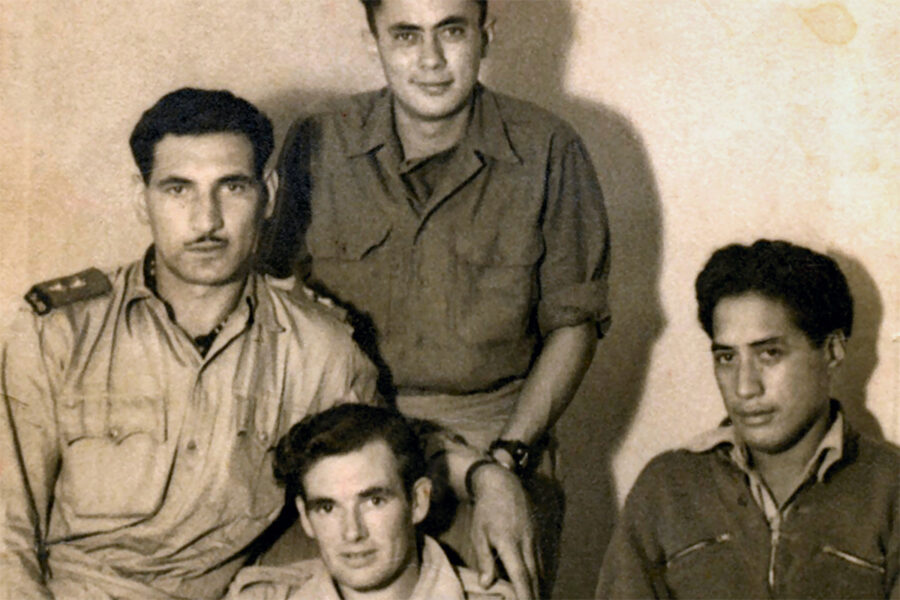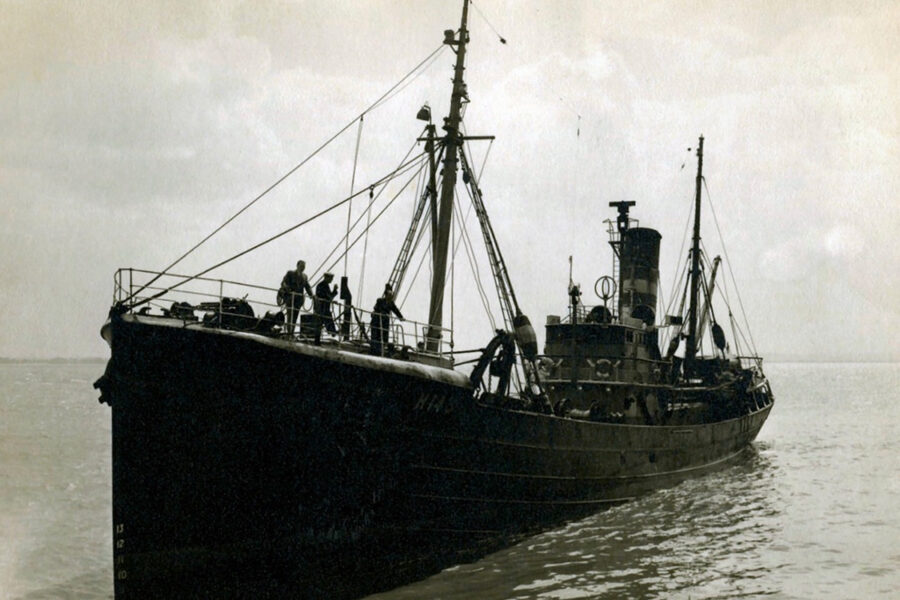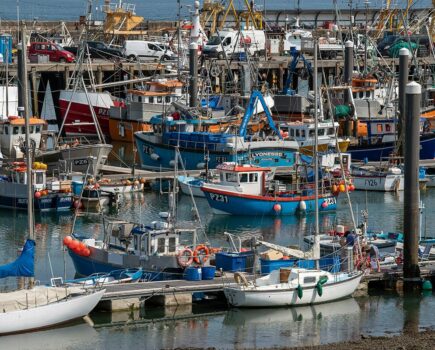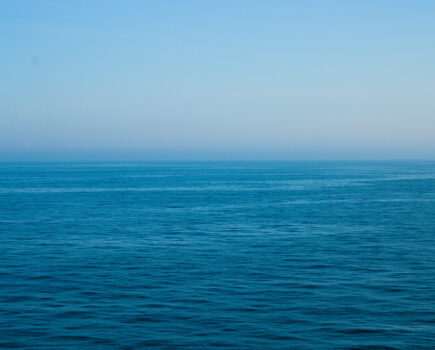More stories behind nicknames from Hull’s trawling heyday
By Alec Gill
My project to collect the nicknames of Hull trawlermen started in around 1985, and I eventually gathered some 300. I also discovered that nicknames extended into many other areas of fishing.
This week’s selection ranges from a wartime undercover hero to a superstitious crewman with the misfortune to sail on the last trip of the Kingston Peridot.
The Duke
George Carling was a deckhand with a noble name, and many Hessle Roaders spoke about him with great respect. He had the habit of wagging his finger and saying: “Now, let me tell you…”.
His son George told me about his dad’s wartime service in Popski’s Private Army, which was similar to the SAS. It carried out various secret operations in the Western Desert against Erwin Rommel’s German army.
It surprises me that he remained a deckhand during his trawling days out of Hull, and did not work his way up the ranks.

Bring-’em-back-alive Bob
There are a couple of contenders for this nickname. One was Skipper Robert ‘Bob’ Grey – he was by all accounts a very nice chap, but lost three men overboard in January 1955 from the Arctic Scout H 143. She had set sail on Boxing Day for Bear Island. They were six days out from Hull when the ship took a heavy sea. Five men were washed over the side, and only two were rescued.
The other was Skipper Bob Gibbins. When I interviewed him at Hornsea in 1989, he proudly claimed that some crewmen called him ‘Bastard Bob’ as well. He admitted he ‘took great risks to get fish’, and some men were lost as a result. He was fined £300 by the Russians for poaching in their waters.
Eager (or Charlie) Teager
This was a Danish skipper with the long name of Thyge Anderson Enevoldson. Hull crewmen found it difficult to pronounce – hence his nickname.
Aged 66, on 5 March, 1933, he chose to go down with his ship Lord Deramore H 461. His three engineers were trapped below in the engineroom. After seeing the rest of the crew safely into the lifeboats, he refused to abandon the engineers to their fate, and went down with them.
Chuffer
Bosun John ‘Chuffer’ Harrison, whenever he was on his way to join a ship, had a reputation for taking along, as the ship’s cat, any moggie he happened to see sitting on a window-sill. Frantic neighbours would rush up to his wife Annie May yelling: “Your John’s taken our pissing cat to sea again!”
Dasher Ellis
Jack Ellis served in the Royal Naval Volunteer Reserve during the First World War, and by chance happened to be in Hull on Armistice Day 1918. He decided to join the trawling industry, and was skipper of the St Wistan H 486 when she was blown up in the Second World War. He managed to get her back to port with no loss of life – and was decorated with the DSC.
Dasher lived on Hull’s Skippers’ Alley – the posh Boulevard. He later became a manager at Thomas Hamling, before retiring in 1965. He lived until 1983.
Apparently he had big feet, and his nickname came because he was always rushing from one job to the next. His son Rob, a friend of mine, became a top skipper and the author of two books about his trawling life in Arctic waters.
Bacon Face or Bacon Chops
Johnny Pattison loved bacon. He sometimes stopped gutting early, quietly sneaked down to the messdeck, and scoffed as much bacon as he could before the others arrived.
Freezer Frost
This was the skipper of the Thomas Stratten H 116, who could ‘neither read nor write, but he could count up to 10 – no one ever cheated him’. He earned his nickname because he could ‘smell’ bad or cold weather approaching at sea – perhaps that was to be expected with a surname like Frost. He must have been an old-time skipper, because the Thomas Stratten was sunk by a mine off the Hebrides during the First World War on 20 October, 1917.
Ice Pound Andy
This was the deckhand who died at sea, but lived to tell the tale. His crewmates thought he had died of natural causes, so they placed his body on ice in the fishroom. This was the usual practice when returning corpses to Hull.
A few hours later, there was a frantic banging from underneath the hatch cover. Andy had regained consciousness, and wondered where on earth he was. Shocked crewmates got him out, and he was known as Ice Pound Andy from then on.
Cockney
Henry Riches was nicknamed ‘Cockney’ simply because he came from London. He received orders to replace the cook of the Kingston Peridot H 223, who had fallen ill. Before flying off to Reykjavik, Henry called
to see his sister Maureen in Hull. The Riches were a highly superstitious family, and he was keen to leave all his loose change with her – the belief
was that if a fisherman took any money to sea, he would have a poor trip.
In addition, he left a small pair of scissors. She was unhappy to have them because it was believed to be bad luck to accept any sharp item without giving a payment in return – otherwise, it ‘cuts’ the friendship. But because he did not want to take money with him, he refused the token payment. It was left at that, because he was in a rush to get on his way.
That was the last Maureen saw of her brother. The Kingston Peridot was lost with all hands in a blizzard off Iceland on 26 January, 1968.
Nicknames in the community

Ashore, there were nicknames for places as well as people. One particular example is the ‘fishermen’s pub’ on Hessle Road. When it opened in 1882, it was named Star and Garter. Henry Rayner was the landlord there from 1921 to 1939, and since then it has been known as ‘Rayners’.
This nickname was so entrenched that the brewery renamed the pub Rayners in 1988. Other pubs also had local names like ‘Millers’ for Dairycoates Inn and ‘Loco’ for the Locomotive Hotel. The Criterion was shortened to ‘Cri’, and the Neptune Inn was ‘Little Neppie’.
Schools were also subject to the nicknaming game. West Dock Avenue School had two nicknames. The first was ‘the BBC’ for ‘Barrow Boys College’. This was because it was close to St Andrew’s Dock, and some of the older boys worked as barrow lads during their summer holidays. Another nickname was Fish Dock College. The nearby Scarborough Street School went one better with its nickname: Fish Dock University.
This story was taken from the 29 May 2025 issue of Fishing News. For more nostalgic reports on the UK and Irish commercial fishing sector, subscribe to Fishing News here or buy the latest single issue for just £3.50 here.
Sign up to Fishing News’ FREE e-newsletter here.








